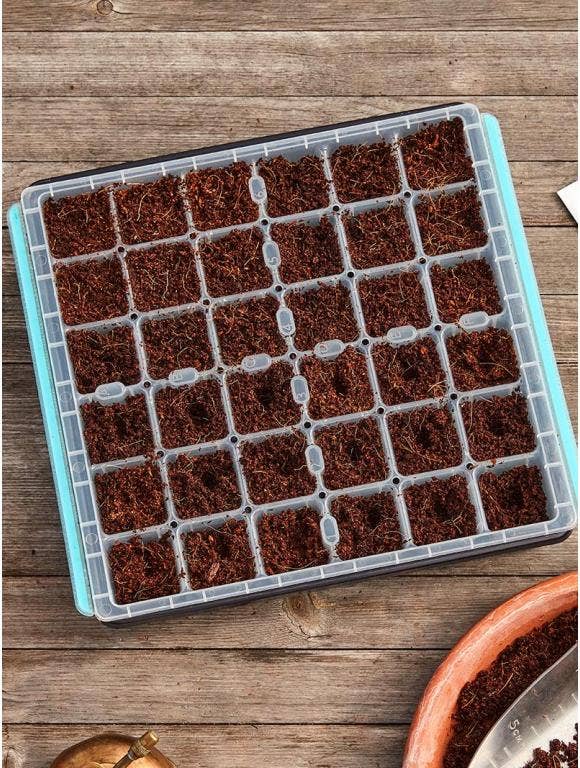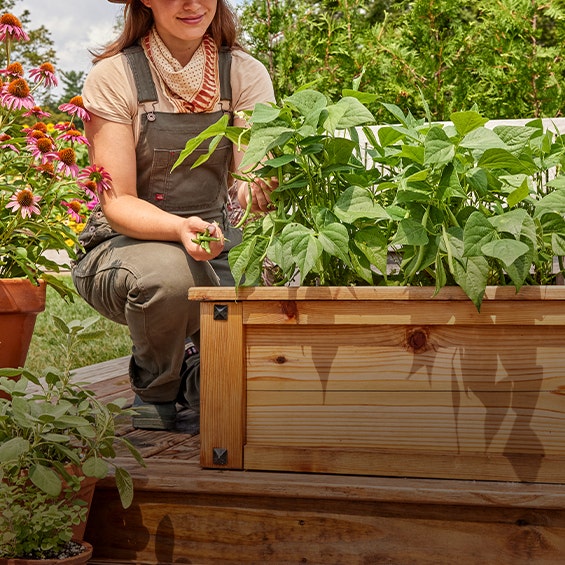


Whether you sow in the spring, summer or fall, there's nothing that sparks impatience in a gardener quite like the anticipation of waiting for new seedlings to emerge. But if you feel like the waiting game has gone on for longer than it should, you may find yourself wondering, "Why didn't my seeds sprout?" Chances are, it's due to your seeds not germinating. However, there are many possible culprits — and luckily, many possible solutions — to get those seeds in gear.
The Wrong Amount of Water
If your seeds aren't germinating, first examine the amount of water you're providing. Too much or too little water is the most likely reason for seeds not germinating. With too little or no water, seeds remain dormant. With too much water, seeds become susceptible to rot or infection from soil-borne fungi (also referred to as "dampening off").
Luckily, balancing the amount of water your seeds need is an easy fix. Seeds need evenly moist soil to germinate and grow their strongest. Provide steady, even moisture by watering lightly with a spray bottle or a hose on a gentle setting as often as needed to ensure the soil never dries out. If the forecast calls for rain, skip watering and let Mother Nature provide the H2O.
The Wrong Temperature
If you planted your seeds just before a late-spring cold snap or summer heatwave, extreme temperatures could be the reason for your seeds not germinating. While some early vegetables, such as peas, can sprout in temps as low as 40 degrees F, most vegetables will stall out until temperatures exceed at least 50 degrees F.
Your seed packet will provide specifics about your plants' ideal germination temperature. But as a general rule, aim for temperatures above 50 degrees F. For warm-season vegetables, wait to plant until 2-3 weeks after your average last frost date when there is no danger of frost. If you're starting seeds indoors, you can adjust the temperature as needed using grow lights and heating pads.
Incorrect Planting Depth
If you eyeballed the depth when you planted your seeds, and now they aren't growing, the depth of the seeds could be your problem. When starting your seeds, consult your seed packet for your plants' preferred depth. Some seeds need light while other seeds need darkness to germinate.
Next time, use a garden dibber or ruler to make sure you've dug to the exact depth. If you've already planted and believe you mismeasured, simply try again with new seeds. The correct planting depth will make a big difference. Learn more about planting depth with Burpee's Garden Guide.
Seed Age and Storage
If you planted a packet of seeds you found in the back of your garage cabinet, you could be dealing with poor-quality or old seeds. The age of the seeds and where you've kept them can affect how well they'll perform. While seed can last 1-5 years depending on the type of seed and how it is stored, corn and onions should be used within the year tested. Most seed can last 3-5 years.
Your seed packet will have a use-by date printed on it. If it's past that time, consider throwing the packet out and starting fresh. Or, if you want to give them a go, the University of Maryland Extension suggests putting 20 or so seeds on a moistened paper towel. Roll it up, place it in a plastic bag, puncture some holes and sit it atop your refrigerator. See how many have germinated in 7-10 days. If it's less than 50%, you're better off finding a new packet.
Going forward, if you do have leftover seeds at the end of the growing season, store them in a cool, dark, dry place. They should not be stored in the refrigerator or freezer.
Unwelcome Wildlife
No matter where you live, wildlife can wreak havoc on even the best-planned gardens. Your garden plot might become an impromptu bird feeder for the neighborhood flock, or hungry rabbits could turn newly sprouted plants into a buffet.
Create a physical barrier with chicken wire, netting or another obstacle. If you're dealing with digging animals, bury your fencing at least 4 inches underground. You can also try a homemade deterrent around your garden such as hot pepper spray or garlic paste.
The Type of Plant
Some plants just take longer than others to germinate. While some plants, like lettuce, can germinate in just two or three days, others, such as lima bean, parsley, carrot and okra, need up to 21 days to sprout.
Keep watering and waiting. Your patience will pay off.
My Plants Sprouted But Aren't Growing
If your seedlings emerged from the soil but haven't done much since, there are a few possible reasons this could be happening. In addition to all of the issues listed above, it's also worth looking out for:
Poor Soil Quality
Your soil may have had enough nutrients to get your plants started but not enough to keep them thriving. Test your soil, then use your results to develop a fertilizer plan that will give your garden the nutrient boost it needs.
Not Enough Sunlight
Most vegetables and herbs and many flowers require at least six hours of direct sunlight per day. If your garden is too shaded, look for any obstructions you can remove, consider relocating your plants, or live with a lower output this year and find a sunnier spot next spring.
There are many possible reasons for your seeds not germinating. However, with a little investigating and adjusting, you'll have a flourishing garden and will never have to wonder, "Why did my seeds not sprout?" again.
For more help germinating seeds for your garden, take a look at Burpee's tools and supplies for seed starting.
There are many possible reasons for your seeds not germinating. However, with a little investigating and adjusting, you'll have a flourishing garden and will never have to wonder, "Why did my seeds not sprout?" again.
For more help germinating seeds for your garden, take a look at Burpee's tools and supplies for seed starting.



